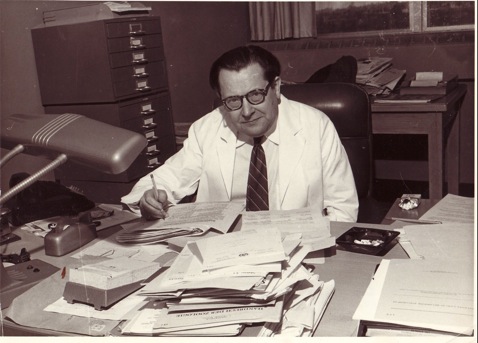“路德维希·冯·贝塔郎菲 Ludwig von Bertalanffy”的版本间的差异
http://c2.com/cgi/wiki?$1>Wanting |
http://c2.com/cgi/wiki?$1>Wanting (→更多信息) |
||
| 第92行: | 第92行: | ||
=== 更多信息 === | === 更多信息 === | ||
| + | 这个是关于贝塔朗菲的介绍网站:http://www.isss.org/lumLVB.htm | ||
| + | 这个是wikipedia的页面,主要涵盖了一些个人成长的事件以及主要的研究领域:https://en.wikipedia.org/wiki/Ludwig_von_Bertalanffy | ||
| − | |||
| − | |||
| − | |||
2020年1月14日 (二) 17:15的版本
基本信息
卡尔·路德维希·冯·贝塔郎菲(Karl Ludwig von Bertalanffy )是一位奥地利生物学家,他是一般系统理论(general systems theory GST)的创始人之一。一般系统理论是一个跨学科的探索,主要是系统与相互租用的组成部分,主要应用与生物学、控制论等其他领域。他指出热力学定律只适用于封闭系统,但是不一定适用于生物之类的“开放系统”。
出生于1901年9月19日,去世于1972年6月12日。
研究领域
生物学(biology) 及系统论(systems theory)
主要研究贡献
个体生长模型 Individual growth model
贝塔郎菲在1934年发表的个体生长模型被广泛地应用于生物模型中。
在他最简单的版本中,增长方程被表述为长度岁时间的微分方程,长度为 (L) ,时间变化是 (t):
[math]\displaystyle{ L'(t) = r_B \left( L_\infty - L(t) \right) }[/math]
[math]\displaystyle{ r_B }[/math]在方程中代表的是贝塔郎菲生长率, [math]\displaystyle{ L_\infty }[/math] 代表个体的最终长度。这个模型最早是由August Friedrich Robert Pūtter (1879-1929)提出来的,
贝塔朗菲方程 Bertalanffy equation
贝塔朗菲方程式是描述生物有机体生长的方程式。 这个等式是由贝塔朗菲在1969年提出的。 [1]
[math]\displaystyle{ \frac{dW}{dt}= \eta S- k V }[/math]
这里的W代表生物体的重量,t代表时间,S代表生物体的表面积,V代表生物体的物理体积。
系数[math]\displaystyle{ \eta }[/math] 和 [math]\displaystyle{ k }[/math] 分别代表“合成代谢系数”和“分解代谢系数”
所以上述方程的解是:
[math]\displaystyle{ W(t)=\Big(\eta\,c_1 -c_2\,e^{-\tfrac{k}{3}t}\Big)^3\,, }[/math]
其中 [math]\displaystyle{ c_1 }[/math] 和 [math]\displaystyle{ c_2 }[/math] 都是常数。
贝塔朗菲在其工作中没有解释参数[math]\displaystyle{ \eta }[/math] 合成代谢系数和参数 [math]\displaystyle{ k }[/math] 分解代谢系数的含义, 引起了生物学家的批评. 但是贝塔朗菲方程可以看作是更一般的生物生长方程Tetearing方程的特例,[2] Tetearing方程决定了系数 [math]\displaystyle{ \eta }[/math] 和 [math]\displaystyle{ k }[/math]的物理含义.
贝塔朗菲方程 Bertalanffy module
为了纪念贝塔朗菲,生物系统工程科学家霍华德 · 托马斯 · 奥德姆 Howard T. Odum将贝塔朗菲的通用系统语言的存储符号命名为贝塔朗菲模块。[3]
一般系统理论 General system theory
这位生物学家在系统理论方面作出了巨大的贡献,特别是他提出了一般系统理论(general system theory),该理论定义了一个广义的系统,应用于多个研究领域,强调整体论而非还原论,有机体而非机制。一般系统理论的基础是组成整体的各元素之间的相互关系。
主要文章及著作
- 1928, Kritische Theorie der Formbildung, Borntraeger. In English: Modern Theories of Development: An Introduction to Theoretical Biology, Oxford University Press, New York: Harper, 1933
- 1928, Nikolaus von Kues, G. Müller, München 1928.
- 1930, Lebenswissenschaft und Bildung, Stenger, Erfurt 1930
- 1937, Das Gefüge des Lebens, Leipzig: Teubner.
- 1940, Vom Molekül zur Organismenwelt, Potsdam: Akademische Verlagsgesellschaft Athenaion.
- 1949, Das biologische Weltbild, Bern: Europäische Rundschau. In English: Problems of Life: An Evaluation of Modern Biological and Scientific Thought, New York: Harper, 1952.
- 1953, Biophysik des Fliessgleichgewichts, Braunschweig: Vieweg. 2nd rev. ed. by W. Beier and R. Laue, East Berlin: Akademischer Verlag, 1977
- 1953, "Die Evolution der Organismen", in Schöpfungsglaube und Evolutionstheorie, Stuttgart: Alfred Kröner Verlag, pp 53–66
- 1955, "An Essay on the Relativity of Categories." Philosophy of Science, Vol. 22, No. 4, pp. 243–263.
- 1959, Stammesgeschichte, Umwelt und Menschenbild, Schriften zur wissenschaftlichen Weltorientierung Vol 5. Berlin: Lüttke
- 1962, Modern Theories of Development, New York: Harper
- 1967, Robots, Men and Minds: Psychology in the Modern World, New York: George Braziller, 1969 hardcover: ISBN|0-8076-0428-3, paperback: ISBN|0-8076-0530-1
- 1968, General System Theory: Foundations, Development, Applications, New York: George Braziller, revised edition 1976: ISBN|0-8076-0453-4
- 1968, The Organismic Psychology and Systems Theory, Heinz Werner lectures, Worcester: Clark University Press.
- 1975, Perspectives on General Systems Theory. Scientific-Philosophical Studies, E. Taschdjian (eds.), New York: George Braziller, ISBN|0-8076-0797-5
- 1981, A Systems View of Man: Collected Essays, editor Paul A. LaViolette, Boulder: Westview Press, ISBN|0-86531-094-7
贝塔朗菲第一篇关于一般系统理论的文章:
- 1945, "Zu einer allgemeinen Systemlehre", Blätter für deutsche Philosophie, 3/4. (Extract in: Biologia Generalis, 19 (1949), 139-164).
- 1950, "An Outline of General System Theory", British Journal for the Philosophy of Science 1, p. 114-129.
- 1951, "General system theory - A new approach to unity of science" (Symposium), Human Biology, Dec. 1951, Vol. 23, p. 303-361.
研究课题
相关链接
视频
[视频网址 视频名称]:视频主题 //可展开说明视频的重点内容、影响、背后的故事等等。
更多信息
这个是关于贝塔朗菲的介绍网站:http://www.isss.org/lumLVB.htm 这个是wikipedia的页面,主要涵盖了一些个人成长的事件以及主要的研究领域:https://en.wikipedia.org/wiki/Ludwig_von_Bertalanffy
- ↑ Bertalanffy, L. von, (1969). General System Theory. New York: George Braziller, pp. 136
- ↑ Alexandr N. Tetearing (2012). Theory of populations. Moscow: SSO Foundation. p. 607. ISBN 978-1-365-56080-4.
- ↑ Nicholas D. Rizzo William Gray (Editor), Nicholas D. Rizzo (Editor), (1973) Unity Through Diversity. A Festschrift for Ludwig von Bertalanffy. Gordon & Breach Science Pub
